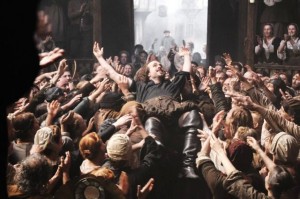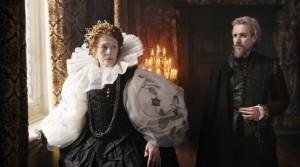
Calling Anonymous Roland Emmerich’s masterpiece ranks high on the list of most meaningless claims of 2011. It happens to be true, but when you realize that the competition for that accolade is made up of titles like Godzilla (1998), The Day After Tomorrow (2004), 10,000 BC (2008) and 2012 (2009), it becomes obvious that the bar is set so low that a salamander couldn’t do the limbo under it. Applying the same kind of scrupulous care to history he has shown to matters of science and physics, this “blistering expose” of who “really” wrote all those plays attributed to William Shakespeare, Emmerich has created something that might better be called How Richard III Got His Hump. None of this means that the film isn’t entertaining. It is, though not always in the ways that it means to be.

Now, I’m not saying that there’s no reason not to question whether or not Shakespeare wrote all those plays. That discussion has been going on forever, and some intriguing—if hardly iron-clad—cases have been made. This isn’t one of them. Even most of the group of folks called “Oxfordians”—the people who believe that Edward de Vere, the 17th Earl of Oxford, wrote the plays—seem to have distanced themselves from this quite astonishing work, which, among other things, wants us to buy that de Vere knocked off A Midsummer Night’s Dream as a precocious lad of about 9. This, however, is the but the tip of the movie’s deliriously overheated concoction that frequently doesn’t even make narrative sense within the confines of its own absurdity.

It wouldn’t matter so much if the film was utterly stylized, but it’s not. It’s actually presented as a history lesson introduced with grave authority by Derek Jacobi (though the film itself—unlike the trailer—doesn’t have him say, “But what if I told you Shakespeare never wrote a single word?”). This does cleverly transform itself into a theatrical production of the alternate story of Shakespeare, as imagined by Emmerich and screenwriter John Orloff, which quickly turns—kind of like those Busby Berkeley production numbers—into the movie itself. The problem is that Emmerich takes all of this very seriously indeed—and to prove it, he’s going to goose the melodrama on every possible occasion. (I doubt a single dramatic event or Important Line escapes being punctuated with a thunderclap, giving the film the sense of taking place in some kind of meteorological purgatory.)

What makes it even more remarkable, though, is that Emmerich genuinely seems to believe all this stuff, with its political intrigues and people whispering behind columns and statuary. But then again, he also seems to believe that Mozart’s “Requiem” was around in 1571. Considering that all this happens 185 years before Mozart was born, it’s an even more remarkable feat of prodigy run riot than the idea that A Midsummer Night’s Dream was the work of a 9-year old. Yes, I know it’s meant to be an ironic comment to play a requiem over De Vere’s marriage to Anne Cecil (Helen Baxendale), but it’s the only such thing in the film and sticks out like a handful of sore thumbs. All this results in camp and unintentional humor of the highest order. When Anne breaks in on De Vere, finding him scribbling away, she blurts out in horror, “My God! You’re writing again!” Here, Anonymous equals the classic, “Discontinue that so-called ‘Polonaise’ jumble” line from the 1945 Chopin biopic A Song to Remember.

So why, you may ask, am I recommending Anonymous? Well, I can’t deny that it’s nicely made, and its superb cast does the best it can with the frequently impossible script—though Rafe Spall’s portrayal of Will Shakespeare as a horny buffoon who literally can’t write his name in the dirt with a stick is a bit much. That, however, is part of the appeal. The film is so loopy—and so convinced that it’s not—that it’s pretty irresistible entertainment. Just, for goodness sake, don’t take it seriously. Whatever it is, it ain’t history. Rated PG-13 for some violence and sexual content.




When Anne breaks in on De Vere, finding him scribbling away, she blurts out in horror, “My God! You’re writing again!”
That’s almost as good as:
“She left! With the Trojans!”
from TROY.
This quote puts me in mind of the classic line, uttered by Patrick Macnee in “Shadey.”
“You let her eat coal
“You let her eat coal
That’s even better!!
Hmm, interesting but I think I’ll wait for a Christopher Marlowe bio-pic/Shakespeare-conspiracy-theory film to come along. But glad to see this finally made it to town; seems there have been more than a few people clamoring to see it.
That’s even better!!
Yeah, I know.